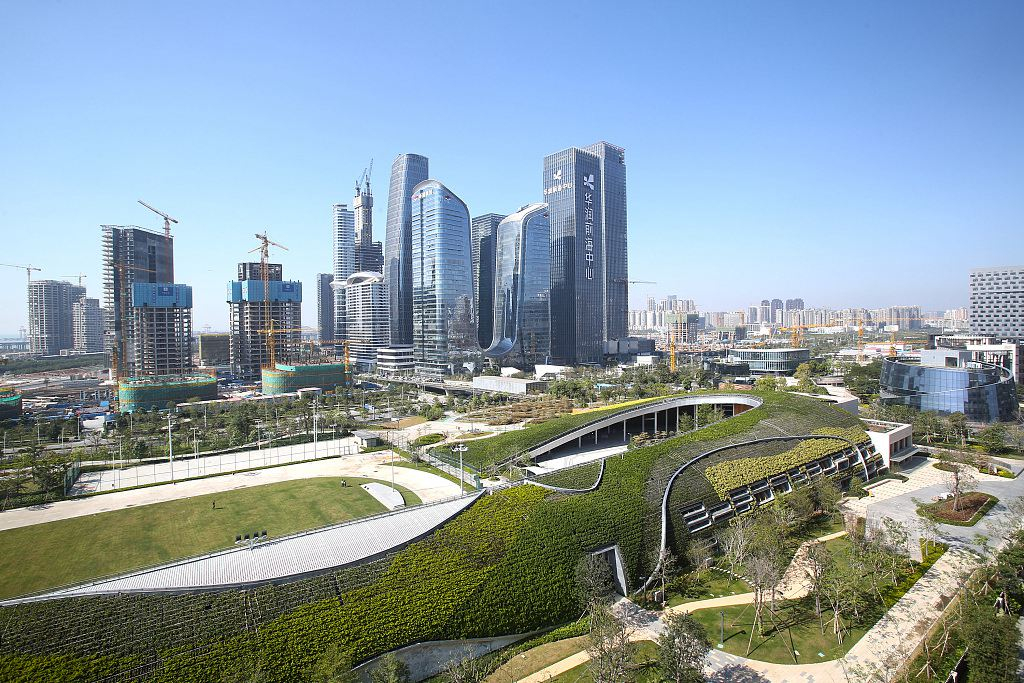

Henri Peng and his team have aspired to build a fashionable brand with smart tech.
A year ago, they came to Qianhai, a service industry zone in the south China city of Shenzhen jointly established by the governments of Guangdong Province and the Hong Kong SAR. The Walnut is now their startup.
In one of the clips posted on Walnut's official website, a foreign skateboarder was stunned by its new product, Spectra X, which is able to automatically speed up once it senses a weight shift.
"This is crazy, dude," the user on the e-skateboard exclaimed. "No remote or anything."
Another user in the clip echoed, "It's really innovative."

China (Guangdong) Pilot Free Trade Zone, Qianhai & Shekou Area of Shenzhen. /VCG Photo
Qianhai, "front waters" in Chinese, is considered the "front area" of Shenzhen, China's southern metropolis that Beijing plans to build into a "global model city with distinguished competitiveness, innovation capacity and influence."
Five years ago, the local authority initiated a hub for youth community, the Qianhai Shenzhen-Hong Kong Youth Innovation and Entrepreneur Hub, or the Qianhai "dream works," in a bid to unleash young generation's innovative potentials.
The initiative is also a part of the development of south China's Greater Bay Area -- Guangdong Province, and the special administrative regions Hong Kong and Macao.
That many Hong Kong entrepreneurs locate their startups is not just because of Qianhai — the core part of the Greater Bay Area. "For those overseas-oriented businesses like Walnut's e-skateboard, mainland's resourceful industrial chain and the growing number of talent who studied overseas are also the matter," Henri explained.

Qianhai Shenzhen-Hong Kong Youth Innovation and Entrepreneur Hub in Shenzhen, south China's Guangdong Province. /VCG Photo
"Startup companies can enjoy the favorable policies regarding their rent, accommodation and taxes," he added.
Till now, 388 companies operate their businesses in the hub, with half of them run by teams led by young entrepreneurs from Hong Kong, Macao and Taiwan, as well as internationals.
Among them, Jason, who is working with an AI camera startup, shared advice with his peers.
"Entrepreneurs should take advantage of the technology, capital, talent and supply chain here, which is more resourceful than in other places," he said, adding that Chinese brands overseas are still a few and expected more, and young entrepreneurs should take the lead in this trend.
Opportunities are in pipeline, as the Qianhai authority this year began to introduce internship program to Hong Kong college students, supporting their business activities in the area.
"We help place capital for the talent and turn their intelligence into fortune," said Wang Jinxia, the deputy head of the authority. "All rarities!"
According to Wang, young entrepreneurs there can enjoy free rent for the business site, programs subsidies and financial services in the "eco-chain" for entrepreneurship and innovation, which is evidence of the authority's goodwill of shared prosperity across the border.

Copyright © 2018 CGTN. Beijing ICP prepared NO.16065310-3
Copyright © 2018 CGTN. Beijing ICP prepared NO.16065310-3